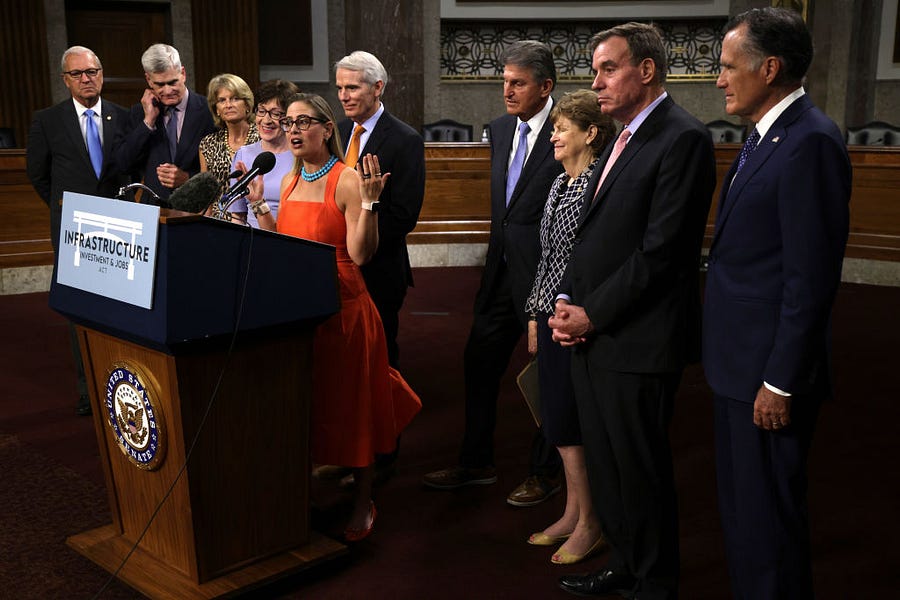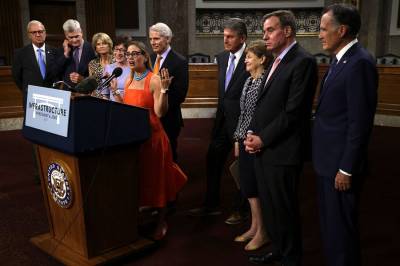Even as the two-party system has remained rather stable over the course of American history, new political identities have always been proliferating in response to social, cultural, and economic trends and events.
There were the rowdy “workies” and “Loco Focos” of Jacksonian America, who arose in response to the dislocations wrought by the “Market Revolution” of the early 19th century and were more or less incorporated into the Democratic Party’s fold. Then, of course, there were the antebellum, anti-slavery advocates who spanned both the Democratic and Whig Parties (remember that antebellum Democrats weren’t always purely pro-slavery; the Free Soilers were largely Jacksonian Democrats), and then opted for third-partyism, first unsuccessfully (the Liberty Party) and then successfully (the Republican Party). Later on, there were the “Progressives” of the early 20th century within both the Republican and Democratic parties, and even formed their own third party in support of Teddy Roosevelt’s 1912 presidential bid as the nation sought to grapple with the social and economic changes brought on by industrialization.
There are more recent examples, too. The movement conservatives that grew out of opposition to the New Deal offered a unique brand within the Republican Party before overtaking it during the Reagan era. There were also the Arthur Schlesinger-style mid-20th century liberals (like the Americans for Democratic Action) who sought to uphold a left-of-center politics within the Democratic Party while distancing themselves from Progressives and Communists.
Some of these political identities spanned the two major parties, some formed third parties themselves, and some overtook one of the two major parties. While they differed in terms of their long-term electoral success, they all arose in response to potent forces in American life to which the two-party establishment, to some degree, was failing to adequately respond.
An Opportunity for a New Political Faction Today
I firmly believe that we have reached a similar moment, at which there is a great deal of opportunity for a new political identity, or faction, to be forged in response to a potent political and cultural shift at work today—namely, the assault on truth.
Both the left and the right and their respective political parties have shunted aside truth in different ways. They have lent credence to ludicrous conspiracy theories (think of Trump’s election lies), advocated limitations on free thought and speech (think “cancel culture”), and stayed silent as co-partisans advance ludicrous policy proposals that fly in the face of very basic, inescapable realities of human nature (think “defund the police”). To varying degrees, they have prioritized tribal loyalty or purity over common sense. Their willingness to detach political ideology and advocacy from truth and reality, and to defend their partisan tribe instead of telling the truth, has opened the door to a new political faction.
This faction would place the process of seeking—and telling—the truth at the very core of its political identity. It would be concerned above all with getting things right, so to speak, even if that meant cutting against certain left-wing or right-wing orthodoxies.
This faction’s adherents—let’s call them Truth Seekers—would garner support from both sides of the spectrum, since plenty of liberals and conservatives alike have been turned off by their respective in-groups’ assault on truth in recent years.
Many on the left are repelled by the quasi-religious, totalizing nature of “anti-racist” and “woke” political thought that has gained so much purchase within the Democratic Party since the events of last summer. Some have spoken out within intellectual homes like Persuasion magazine, but most—especially those who are not members of the media class—are left whispering their dissents in private. They lean liberal, as they prioritize moral values like compassion and equality over authority, order, and freedom (to use variations of Jonathan Haidt’s moral “taste bud” categories). Moreover, their liberalism is an upshot of their lived experience and moral intuitions. It’s open to revision. It is not so core to who they are that they must cram every fact or politically salient event into its framework. The facts—i.e., reality—inform their liberalism, as opposed to the other way around.
But their in-group bars them from voicing what they take to be the truth publicly. If they were to speak out, they very well may be subject to social ostracization or even cancellation. Orthodoxies are upheld through a culture of fear. Without forsaking their left-of-center politics, many liberal and even progressive Americans are looking for a safe space—a political faction, even—where they can voice the truth as they see it and engage with like-minded free thinkers.
The right, of course, has its own versions of cancel culture and assaults on the truth. Much ink has been spilled regarding Donald Trump’s and his supporters’ fraught relationship with the truth. The key point is that Trumpism is ready and willing to trample over numerous small-t truths in the service of a larger perceived capital-T Truth. The capital-T Truth is that real America has been wronged in myriad ways, Donald Trump is a fighter, and the liberal establishment and RINOs are subverting his efforts at every turn, including via illegal and unfair maneuverings by the “deep state” and others. Given this capital-T Truth, small-t truths—from the size of Trump’s 2016 inaugural crowd to the legitimacy of the 2020 election—can be warped and trampled upon as needed. Right-wing epistemology—much like the fundamentalism of the woke left—first assumes the Truth and confronts reality from there rather than allowing reality and the many events and facts of life that comprise it to inform its worldview.
Plenty of right-leaning centrists and true-blue conservatives are less than enamored with these developments. The fanciful thinking of right-wing populism is just as distressing and misguided as liberal utopianism.
Faction, Not Party
These reality-cognizant, truth-seeking liberals and conservatives should join forces not as a new political party, as their policy differences and moral intuitions are too profound, but as a new cross-partisan faction. They can continue to vote differently, disagree on tax rates, and diverge on the morality of abortion, but they can and should openly acknowledge that they share an epistemological framework. That is, they both hold the simple yet profound assumption that in politics, truth matters, and that politics ought to respond to and cope with reality rather than seeking to overcome it.
Truth Seekers would be willing to allow reality to continually mug them and then press charges time and time again. They would take pride in allowing events, experience, debates, and reflection to shape and even change their thinking on important political matters, and then revise their opinions and policy positions accordingly. They would prize epistemological openness and humility—the values most necessary for seeking the truth—over ideological consistency and purity. Truth is complex and messy, so a capacity to cope with contradiction and complexity won’t be scoffed at, but valued.
And if those on the left and right who value truth and seek a reality-cognizant politics did in fact openly form this sort of pro-truth, cross-partisan faction, they could find a sense of political belonging within this shared process of finding truth. As social animals, we do need to feel included, recognized, and valued as members of an in-group in the political sphere. But there is no reason to believe that we cannot find that sense of worth within a process-oriented group.
Indeed, great American political thinkers like Abraham Lincoln have long held forth the hope that we can yoke our passions to small-l liberal principles and processes rather than the more natural impulse to simply belong and dominate the “other.” Moreover, they have attested to the importance of politics taking truth—empirical and moral alike—into account. In reading over the correspondence of the Founding Fathers, their abiding faith in the power of truth and its relation to politics is striking. In an August 1794 letter to Charles Mynn Thurston, for example, George Washington wrote that “truth will ultimately prevail where pains is taken to bring it to light.”
Light can only be shed on the truth through the power of free thought and free speech. In the Virginia Statute for Religious Freedom, Thomas Jefferson proclaimed that “truth is great and will prevail if left to herself; … she is the proper and sufficient antagonist to error, and has nothing to fear from the conflict unless by human interposition disarmed of her natural weapons, free argument and debate; errors ceasing to be dangerous when it is permitted freely to contradict them.”
Thus, as a starting point, this new faction of Truth Seekers can begin with a vigorous, unbending commitment to the principles of free speech. And from there, they can declare themselves loyal adherents to the truth-seeking process in politics. They can take pride in changing their minds when the facts change.
It is time that left-leaning and right-leaning Americans who are worried by the cross-partisan assault on truth, common sense, and reality begin joining forces. We can continue to disagree vehemently, but we must confront that many of our co-partisans are willing to disregard reality in the service of grievance or ideological purity. Even if we concur with their political objectives, we must reckon with the danger of that mode of thinking. Once truth is thrown aside as a meaningless political value, the door has been opened to throwing aside other things of intrinsic value—including individual rights and human lives—in the pursuit of whatever the political objective may be.
It is time, then, that yet another American faction arises to attest to the unchanging fact that in politics, the truth matters.
Thomas Koenig is a student at Harvard Law School and the author of the “Tom’s Takes” newsletter on Substack. Twitter @thomaskoenig98.





Please note that we at The Dispatch hold ourselves, our work, and our commenters to a higher standard than other places on the internet. We welcome comments that foster genuine debate or discussion—including comments critical of us or our work—but responses that include ad hominem attacks on fellow Dispatch members or are intended to stoke fear and anger may be moderated.
With your membership, you only have the ability to comment on The Morning Dispatch articles. Consider upgrading to join the conversation everywhere.